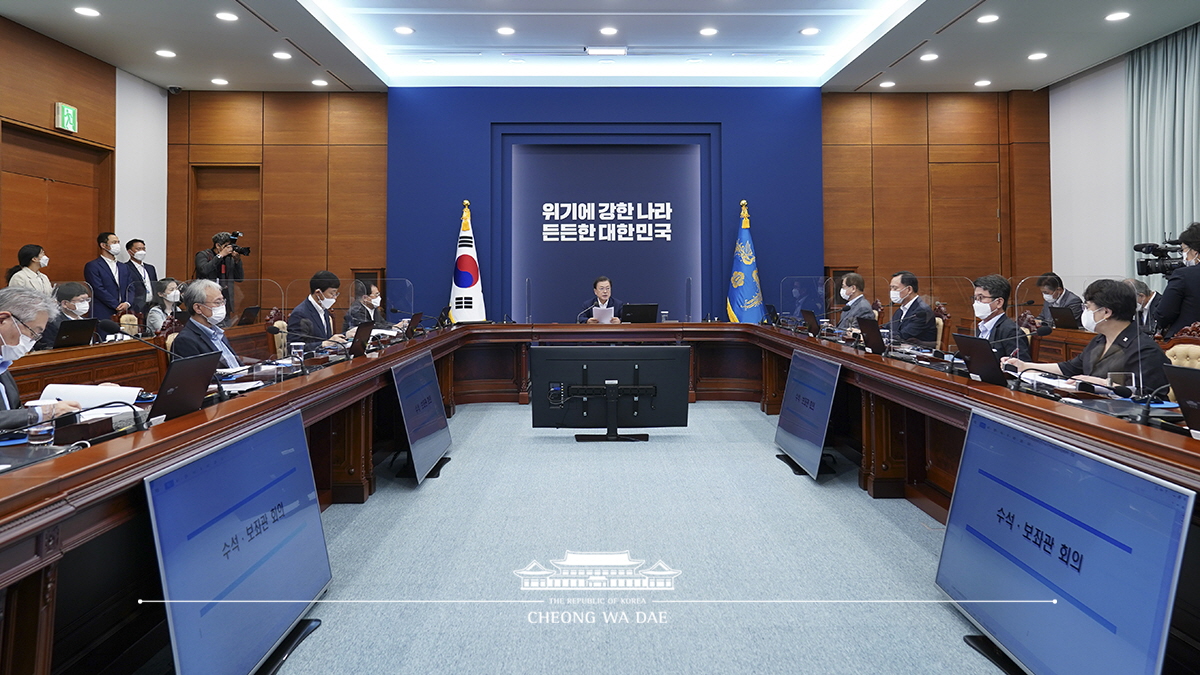이 웹사이트는 제19대 대통령 임기 종료에 따라 대통령기록관이 「대통령기록물 관리에 관한 법률」에 의해 이관받아 서비스하는 대통령기록물입니다. 자료의 열람만 가능하며 수정 · 추가 · 삭제는 불가능합니다.
다만, 「개인정보보호법」에 의하여 개인의 정보를 보호받기 원하시는 분은 관련 내용(요청자, 요청내용, 연락처, 글위치)을 대통령 웹기록물 담당자(044-211-2253)에게 요청해 주시면 신속히 검토하여 조치해 드리겠습니다. 감사합니다.
SPEECHES & REMARKS
BRIEFINGS

Today, two outside experts will join our discussions: President Kim Yong-ik of the National Health Insurance Service and Executive Director Kim Sun-min of the Health Insurance Review and Assessment Service. Thank you for being with us. Let’s welcome them with a big hand.
It is very regrettable that COVID-19 continues to spread with hardly any noticeable drop and the heightened social distancing levels must be kept in place. Our people must also feel the same way. However, even though the intensive anti-epidemic measures implemented so far have not curbed the spread of infections, they have clearly been effective in keeping the spread of the disease from spiking. Despite the ongoing vaccinations, the Delta variant is spreading at a frightening pace and has pushed up the number of confirmed cases worldwide for six weeks in a row. Many countries, one after another, are also recording all-time highs in their caseloads, facing yet another crisis.
Compared to situations in other countries, our anti-epidemic and medical systems have been able to keep the COVID-19 outbreak manageable – thanks to cooperation from the public – after we imposed the highest alert and most stringent epidemic prevention and control measures.
What we do from now will have major consequences. Grave periods still persist. There are only two things we can do at this point to keep people safe and alive. One is to try our utmost to stem the spread of COVID-19, and the other is to increase vaccination rates.
For now, defusing the COVID-19 situation is the most important task. In particular, we have to keep a tighter rein on anti-epidemic measures if for no other reason than to ensure safe in-person classes for our children in the lead-up to the reopening of schools for the second semester. It is also crucial to raise inoculation rates. With vaccinations accelerating again recently, more than 40 percent of the population has received their first dose. We have set our sights on inoculating 36 million people before the Chuseok break. The number targeted for vaccinations will also be raised further and the timetable for herd immunity will be moved up as well.
The supply of vaccines is out of our hands because we have no other choice but to rely on a few overseas businesses for what we need. Nevertheless, by utilizing the doses already secured in the most effective way, we will definitely achieve our vaccination goal earlier than scheduled.
Vaccine production shortages and unstable supplies still remain a huge problem all over the world. In order not to be pushed around by foreign companies, we will expedite the development of domestic vaccines and concentrate national capabilities on vigorously implementing our global vaccine hub strategy.
The rigorous epidemic prevention and control measures in place now are only temporary emergency measures – not something we want to last long. They can only be eased when we control the spread of COVID-19 and simultaneously increase vaccination rates. That would also make it possible to implement a new strategy to safeguard both the economy and people’s livelihoods while maintaining epidemic prevention. To turn this hope into reality, we will do all we can to prevent the spread of COVID-19 and raise vaccination rates. I understand that people are struggling, but I ask them to summon a little more strength.
What is most regrettable is that microbusiness owners and the self-employed are being pushed to the brink with the extension of the intensive epidemic prevention measures. I ask everyone to recognize this as a heavy burden to be shared by our society as a whole. The Government will do everything possible to come up with multifaceted support measures, such as promptly providing assistance for losses through the disbursement of the supplemental budget from next week and alleviating financial burdens and hardships. Local governments are also stepping up to aid microbusiness owners and the self-employed in their areas through a variety of measures. I urge the Central Government to actively back their support programs by providing necessary information and data.
There are also concerns that the spread of COVID-19 and the heightened social distancing levels may hinder our economic recovery. The economic sentiment, which had been improving for several months, is wavering, and the jobs recovery, which had been gaining momentum, is once again slowing. Stabilizing consumer prices on daily necessities is also very important for people’s livelihoods and the economy. I urge everyone in the Government to renew their determination to serve as the last bastion safeguarding people’s lives and to do whatever they can to respond to COVID-19 and protect the stability of livelihoods through pan-government efforts.



